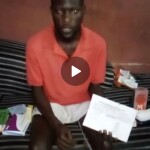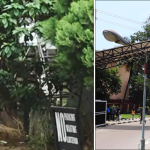Babatunde’s job-hunting turns a nightmare on Ondo govt. premises. And the state disability board cares less
By Elijah Olusegun
Table of contents [Show]
- In 2011, Ondo government legislated against built environment, among other things, that can hazard the well-being and rights of its citizens with disabilities. May 23, an open drain swallowed a 30-year-old, and ruptured his genitals in a fall that drew a lot of blood. Every day since then, the injury threatens to take much more from him.
- But Kareem Babatunde is not just a victim; he’s a husband, and a father of two. He’s also a hustler. Employers he has approached since graduation don’t trust he can deliver, though he has a certificate in special education. And, to the bargain, he’s a diehard. “You can’t know he’s going through all this as a visually impaired person,” Nasirudeen Oladele, the spokesman for the state’s Nigeria Association of the Blind (NAB), told ER. “He cheers people up wherever he goes.”
- He was on the state government office premises the day the accident happened. It was the same government that flaunts the Ondo State Law for Welfare of Persons With Disabilities and Other Provisions (2012) to protect Babatunde and others from danger.
- As disability laws go, Nigeria has no shortage. Apart from the federal government Discrimination Act 2018, no fewer than 13 states have enacted their own versions. All cater to accessibility, inclusion, equality, and participation needs of the PWDs across Nigeria.
- Section 25 (a) of the Ondo Disability Law, which ex-Gov. Segun Mimiko signed, states: As from the commencement of this law: the construction and renovation of public buildings, roads and other facilities for public use, including schools, housing, medical facilities, in door and out door and publicly owned workplaces shall have for the Convenience and use of people with disabilities.
- Its Section 7 also set up the Ondo State Agency for the Welfare of Persons with Disabilities. Among the agency’s functions are: to serve as a vehicle for the protection of the rights; and to protect and represent the interest of all PWDs in the state.
- Folashade Arise chairs its recently inaugurated governing board. Her duties on the board include “making regulations for the carrying into effect of the provisions of this Law”.
- Disability experts, however, insist implementation matters. But it has never been, considering the state of things in all the states that boast of disability laws. The Nigeria Rapid Assessment on Inclusion, a World Bank’s document published in 2020, a year after the nation’s Discrimination Act 2018 took effect, confirms that. It reveals PWDs in Nigeria still face many barriers in accessing social benefits, unlike others with no disabilities.
- Babatunde happens to be one of those who find themselves on the wrong side of the track.
- His job-hunting, seven years long and still counting, took him to the Office of Establishment and Training butting on Gov. Rotimi Akeredolu office at Alagbaka, Akure, in May. He wanted to check the shortlist of applicants that moved up the next stage of recruitment the establishment office supervised that time. Two roads, according to him, lead to its premises. Commercial buses and motorcycles prefer the one behind the office, to save time and fuel. But that is the section of the premises where the government leaves open a drainage system—it has never covered it, anyway. Apart from the uncovered gutters, other hazards to PWDs dot the area, according to the NAB’s official.
- Babatunde got off a commercial motorcycle, and winged his way inside, his guide cane in hand. It helped little that day because the next step he took was into emptiness. It sucked him in right away. He landed crotch and all on the concrete inner slab of the tunnel, with its five-mm-thick iron hook sticking out. The warmth all over his groin made him know he was bleeding from a tear. And the pain that ravaged the area signalled the bluntness of the impact the iron crook and the concrete made on his genitals. Sympathizers came and hauled him out. But the bleeding continued.
- There was no first aid. “No government official from the establishment office or the PWD agency even came,” he said. Somebody just put him on a motorcycle that took him away. The first hospital rejected him—because of the hemorrhage. Doctors at Al Jazeera Hospital later admitted him, and carried out the first surgery that stopped the bleeding, and fixed him a catheter. “He made my hand feel the outer part of the affected area. He said the pain was much,” Oladele said. A preliminary assessment of the injury indicated a trauma to the urethra in particular. That surpassed the worst-case scenario Babatunde and his sympathizers had expected.
- Part II of the Discrimination Act 2018 spells out features of accessible public buildings. The framers even compel governments to retrofit all public infrastructure that predates the Act with accessibility features. The Ondo disability law stated that earlier. It provides that all public buildings in the state be made convenient for the PWDs. And it applies to both new and old structures.
- The government office on the accident scene supervises recruitment into the state’s civil service. It came into existence after the law took effect. And the state’s disability community expects it—and other ministries, departments, and agencies—to comply with the law’s Section 27. But all have failed to.
- And the agency board that should see to the law implementation has demonstrated irresponsibility. Its Chairman Arise didn’t respond to questions ER sent her to seek clarification for this story. And she made no time for the telephone interview appointment she scheduled. “They won’t respond because they are political appointees,” the NAB official said.
- Arise’s silence, in the long run, endangers the rights of all the PWDs in Ondo. In the short run, it heightens the stake for Babatunde. His preliminary diagnosis, dated 26/06/2023 from the Akure Federal Medical Centre (FMC) where Al Jazeera referred him, indicated bulbar urethral stricture. It is the traumatic type that severs a sensitive part of a man’s urinary canal, creating a gap with ends like bulbs. In effect, it staunches the flow of urine.
- “The doctors had to fix a pipe directly to my bladder,” Babatunde said.
- But that remedy is for the meantime. “We have spent over N200, 000 on that and the drugs the doctors recommended,” he said, adding he has been booked for another surgery which will cost more.
- No government office has taken responsibility for the accident. And no one has announced they are picking up the tabs for his medical expenses. Arise ought to have instructed the disability agency to mobilize support for Babatunde, as her duty demands. But she would not be bothered.
- “My church members have been assisting financially,” he said.
- His disability cluster in the state have also rallied round, though some of their leaders hesitate to slam the government for their colleague’s calamity. NAB’s Chairman Ojo Akilo believes Akeredolu has tried for the state’s disability community. Oladele, too. According to him, the governor’s health crisis at that time made it difficult to get his attention. Ordinarily, he noted, Akeredolu would have reached out to Babatunde. “ But the bitter truth remains that the gap is still very wide in terms of what the state has not done for us,” he told ER.
- In weeks’ time, Babatunde will be wheeled into theatre at the FMC. That will count as the second surgery the doctors said will restore his ability to urinate unaided. “We added up the cost, and it is about N1 million,” he said.
- He has no doubt about the expertise and experience of the team of surgeons that will restore his urethra. He, however, clings to his fear: no idea of how to raise the fund yet.
- “I don’t want my suffering doubled: blind, and now about to lose my genitals.”
- He has resorted to pleading to no one in particular. And that is the farthest he can go. The state that gave him rights to move about as a blind person also set him up for a fall on its own grounds, and ignores him.







